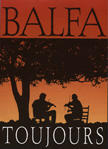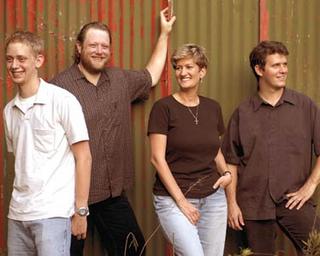Deux Voyages - Balfa Toujours
 The Cajun band Balfa Toujours performed in
The Cajun band Balfa Toujours performed in In 1847, American poet, Henry Wadsworth Longfellow wrote an epic poem describing the tragedy of displacement in, Evangeline, a Tale of Acadie.
The Acadians or, 'Cajuns' as they refer to themselves, still speak French and their language remains alive. I am uncertain how isolated their dialect has become from the rest of the French-speaking world but if it is at all like New Mexico Spanish then I am certain it is probably a bit antiquated.
My paternal ancestors arrived in the New World through
While I speak virtually no French and my translation skills are limited, I do appreciate the beauty of Cajun music because it has a sound that I find familiar, soothing, rooted and beautiful. Its folksiness also bears a resemblance to local New Mexico Spanish music.
People who visit
I admire Cajuns and the descendants of their predecessor’s fellow countrymen in
I have celebrated the importance of women in previous posts and this one is no different. The example I have just described attests to the notion so beautifully put by Abraham Lincoln, 'The hand that rocks the cradle rules the world.' Franco-Canadian endurance as a people is direct evidence that woman is the foundation of culture.
The song Deux Voyages is also the album title released by Balfa Toujours. It is a song which Christine Balfa and her husband - who plays accordian in the band - wrote after visiting their ancestral European homeland. The song is a waltz whose melancholy melody is delivered on the accordion and violin.
 Deux Voyages
Deux VoyagesIls sont partis du pays pour faire un grande voyage
They left the land to make a great journey
Ils ont traversé la mer avec juse leur courage
They crossed the sea with only their courage
Mes pères ont laissé tout pour la liberté
My forefathers left everything of their liberty
Il y avait pas un roi qui pouvait les enchainer
There wasn't a king who could keep them in chains.
[violin and accordian instrumental]
J'ai traversé la mer pour rechercher mon héritage
I crossed the sea to seek out my heritage
Dans le pays de mes pères à leur petit village
To the country of my forefathers, to their little village
Comment ils quitté cette belle place.
How they left this beautiful place,
je peux pas comprendre
I cannot understand
Ils ont risqué tout ils avaient pour leurs descendants.
They risked everything they had for their descendants
If you have a chance, check their music out at one of your local music stores. I am not certain whether any of their music is sampled on the official Balfa Toujours website which I linked earlier. Christine is the daughter of a local




15 Comments:
I love the way you took us back in history and then you recited the poetry related to the culture mentioned at that point of time...Im not so articulate with such history but it had for sure enriched my knowledge..and loved reading the poem....
"The hand that rocks the cradle rules the world..." This reminds me, and is a major example of, a thought I've had about history.
Recorded history is so incomplete and even, in a way, superficial! The people behind the people who "make history" are barely known, or not at all - yet surely they "made history!"
And so many contributions and stories lost to time, that we can't know about...
The range of history that you present is always so interesting and varied. I never knew that there was a separate dialect in New Mexico (I never knew anything in this post, for that matter). If it's something Cervantes could relate to, I'm pretty sure I'd be rather lost. As always, thanks for the information.
*apologizes in advance for what she knows will be a long comment*
As resident French Canadian, I'd like to say a few things starting with that your translation is perfect :)
You said :
"I am uncertain how isolated their dialect has become from the rest of the French-speaking world"
Apparently, Cajun French derives primarily from a mixture of Acadian French, Creole French, standard nineteenth-century French, and English. Some Cajun French words, however, are of African, American Indian, or Spanish origin. Although generally homogenous, Cajun French varies slightly throughout Acadiana, with some areas possessing their own idioms and pronunciations.
I'm expecting I would have a hard-time understanding hard-core Cajun French.
I can tell you though that the Acadians that remained in New Brunswick speak french with their unique accent and a large amount of anglicism, they do still speak french and can be understood by a Québécois such as myself.
You also said that the reason French-Canadian culture and language is still thriving is because the "early settlers brought their women with them."
I just want to add a precision : aside from the wifes of the nobles assigned to govern Nouvelle-France, the first women to settle where the "Filles du Roy" (King's daughters) - mostly prostitutes and were shipped there by the king to his local governor, Jean Talon.
Also, the primary reason in my opinion why French Canadian culture emerged is , at least partially, because an aristocracy was allowed to develop itself prior to the English conquest, thus allowing for a diaspora to form itself and organize resistance movements.
Another important aspect is that because the French settlers were of european origin, it was a conquest war (as opposed to a colonization war) and the English did not completely annihilate the local law, thus leaving most of the french culture intact.
At the time, international usage of the conquest war was to let the "conquered" keep their law with regards to private property and civil rights. To this day, these jurisdictions are governed by civil (code) law, as opposed to common law, which you'd be familiar with, since it's the form of law in effect in the States and English Canada.
Of course, I don't mean to say that there has been no fight. Actually, even though the French were allowed to keep their language, religion and culture, they were treated (and still are, to some degree) treated like lower-class citizens.
There is a difference between being allowed to keep your culture, and not being depreciated because of it. Until not that long ago, to achieve powerful positions, you had to speak english and be of protestant faith. Needless to say, it took a while for any Frenchies to make their way to the government.
However, as we speak, the PM of Canada is a member of the French Canadian minority. Here's hope for the minorities of the world !
Thanks for this interesting post.
By the way, I posted something about FC culture last month :
Quebec National Holiday.
ON ON !
Beautiful delivery Beaver,
I knew I could count on you to shore up my weak spots. I admire your depth of knowledge and your cultural pride. You have provided me with some excellent points to ponder and to gather into my mind whenever I think about assimilation and maintenance of cultural integrity.
I worked assiduously to make sure what i had to say was accurate and in the points where I offered my input on it, I wanted to be rock solid in my delivery. Having a Franco-Canadian who regularly reads me motivated me to toe the line.
I hope my celebration of your culture was enjoyable for you. I have a tremendous regard for Canadians even f they cannot all be Quebqois. ;O)
Believe it or not, there are many Americans who admire and respect Canadians and other nations.
J
iamnasra,
Thank you but I disagree; you are a very gifted poet.
Paul,
That has to be among my most favorite of sayings. I agree that history written from the 'great man' perspective leaves a lot to be desired. Einstein said were its not for the average mind the world would never advance. I often wonder when I read a poem or piece of historical work just how much is left our and how much will never be told. I believe especially in this day and age, the truly gifted people will be those who assimilate and synthesize information because so much is being learned but none of it is being integrated cross-discipline-wise.
Cricketina,
One of my degrees is in History. I would like to one day return to the University in order to pursue advanced degrees. I believe a job on some campus reaching out to those in search of knowledge would be a dream job for me.
Thanks for all your comments,
J
You did a great job, and I was happy to contribute :)
Assimilation is a huge issue in Quebec, and I, myself, am a perfect example of it. Would you beleive it if I told you that both my parents were (almost) unilingual francophones ?
Yet, today, I live and work 90% of the time in English. I'm lucky to have FC friends to catch me back and ground me up. Otherwise, I might just lose my culture altogether. (My blog is a good illustration - it started off completely in french, then was bilingual in february/march 05, to become now 100% english.)
Thank god, my mother is still alive to make me speak french to her !
Joe this is a very informative article. I would love to go to Africa one day before I pass on ... just to wallow in my heritage. The poem is wonderful.
Tell me, what's the different between Cajun and Creole?
Amias,
What I understand about Creoles of the Louisiana variety is that they are people of either Spanish or French descent who were native to Louisiana prior to its becoming a part of the United States in 1803 - the Louisiana Purchase.
The term 'creole' has also evolved to be used as a means of describing New World mixed-blood people - again having at least either Spanish of French blood and any combination of of the following ethnic origins; French, Spanish, Native American and African heritage.
'Cajun' is a contraction of the word, 'Arcadian.' It is reserved to identify Louisianans of French descent - more particularly of the diasporic Arcadians who were displaced secondary to their expulsion from Canada during the French and Indian War - who ended up settling in Louisiana because of it.
It's been many years since I gave much thought to the word 'Creole.' I remember it being an essay question on a history exam. As i recall, this French word's counterpart in Spanish is, 'criollo' and for the most part carries the same meaning regarding descent but is considered an offensive term depending on which Latin American country it is used in.
While the word 'Creole' is used to describe ethnic origin in the US and carries no pejorative meaning, Latin American countries use the word slightly different and it can be used as a means of insult according to regional conventions - meant to imply the person has African blood. Oddly enough the term originally was used to denote upper social standing but it became - watered down' as Europe lost its 'prestige' over time because of the rise of nationalism among Latin Americans who embraced their uniqueness and rejected all things European as 'superior.'
I will research this more and see if I can find anything else about it. Meanwhile, maybe Beaver can offer her input.
Thanks for the question Amias - as always, you made me think.
J
I guess in some countries "Creole" is the same as "nigger" ... how interesting.
My husband is from Louisiana and his folks are Creoles, they speak what they call "broken French", sort of like we here in America speak "broken English". He, of course hasn’t spoken it in so long he doesn't recall how. They are so fair skinned it hard to tell who’s what. I have never seen so many blue eyes before, with the exception of some part of my family in Mississippi. But we won’t go there.
Indeed, in Louisiana, like everywhere else, everyone applies labels. Creole means white, but black … and Cajun means, white with more French…. At least that what my husband jokingly said, with a frown on his face.
But what amazes me is that no matter where one goes, a little African blood in ones family tree causes’ chaos. I guess not too many folks are familiar with the fact that the original Eve was from Africa. Therefore we are all of Africa descent.
All and all this was a good article. You are always educating me about the world I live in, in such away that school never did. Thank you.
Joe,
The way I have been taught the word Criollo does differ from the definition you gave of Creole (I have no personal comparison, as I haven't studied as much French history as Spanish and Latin American history). In the courses I have taken Criollo has always meant the white descendants of Spain, born in the New World (the white Spaniards born in Spain being the Penisulares). There is no mixing of blood, just a distinction of where each purely white person was born. The distinction became important as the Criollos took on New World issues and their loyalty shifted from the crown to the life in the New World. The Criollos started to come in direct conflict with the Penisulares, as the Penisulares had only the crown's matters at hand. From the readings I've done, it seems the Penisulares used this word in a derogatory manner, but a sense of pride of the word grew amongst the people it defined as they started to ban together.
The words I have been taught for mixed descent were (mainly) mestizo, a general mix or a white and indigenous mix, or mulatto, a white and African mix. There were more terms at first to define varying levels of mixture and exact combinations, such as in the casta paintings. However these distinctions faded to the general term of mestizo.
I'm sorry, I have no sources to back this up and all my text books are currently packed away awaiting their trek back to school at the end of the week.
Tina
Perhaps this comment sounds argumentative, I'm bad about that. I merely want to share my knowledge, please take it as such.
Tina,
Your comments are right on the money - I alluded to what you are saying here in my last comment.
We do not differ at all and I do not find your post to be argumentative at all. I appreciate your attention to detail for something which I have been sloppy about.
By all means, I invite your comments and what you have to say is not only valid but correct.
Please review what I said in my last comment and see if what I said does not fall in line with what you articulated - quite eloquently I must say - in your comment.
I was attempting to make a connection between ‘Criollo’ and ‘Creole’ in an attempt to point out that regional interpretation has everything to do with how people perceive or misperceive a word.
One man's compliment can quite easily become another man's put-down. It all depends on who said it and what context it was delivered in.
Please keep commenting Cricketina - I love how you think and I admire your academic integrity.
J
Hey, this comes a tid bit late, but anyways... Can't help pursuing this conversation, as it is close to home :)
According to the Websters, a creole person is either of European descent born in the West Indies or Spanish America, or descended from French ancestors in southern United States especially Louisiana, so it appears that Tina's distinction was correct.
I guess Cajuns are a just a subgroup of the Creole community in Louisiana. You covered that, and i have nothing to add about this particular matter.
I want to point out that I've never heard or seen anything refer to French descendants as Creole in Canada itself. The French minorities outside of Quebec are referred to as Fransaskois (read Fraan-sas-kwah) in Saskatchewan and Franco-X in other provinces.
An important factor to consider is that "creole" also designates a mother tongue that originates from contact between two languages.
Because of the intense melting of cultures in the West Indies, a "creole" was created in Guadelupe, Martinique and Haiti. These were all, as Louisiana was, French Colonies and had important contigents of black slaves who eventually created their own identity and idiom from a mix of french and african dialect.
This may have lead to the general perception that Creole was referring to people of mixed heritage.
As far as the linguistic use of the word, I think it's safe to say it can be used in a general term of any dialect born of 2 idioms, even if it French isn't included (like Cameroonese Pidjin, which is based on African Dialect and English).
Well, I'm done hogging your comment area !
Take care :)
[cross-eyed and scratching head]
Uh - okay.
Damn! I sure have some smart bloggers.
Thanks for the info Beaver. You and Cricket have me weak in the knees. That brilliance knocked my toupee clean off.
J
*parades around and waves at the frantic crowd*
I would not be brilliant if you didn't push me to it, Joe. The intellectual stimulation ur blog had provided me is incredible.
Thank you :)
Post a Comment
<< Home